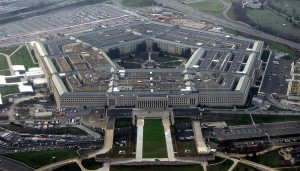Probably the most dominant rhetorical pitch thrown about by politicians and media pundits regarding defense cuts is that they will cost the country much-needed jobs. Actually, the number of jobs in the military industrial complex that would be lost as a result of the puny defense cuts proposed in the sequestration deal is very low compared to the dooms-day predictions.
 Of course, the other piece of the story is that government spending on the military should not be a jobs program, first and foremost because there are other menacing problems with permanent war and “a permanent war economy.”
Of course, the other piece of the story is that government spending on the military should not be a jobs program, first and foremost because there are other menacing problems with permanent war and “a permanent war economy.”
That’s the subject of a new paper from Thomas K. Duncan and Christopher J. Coyne, economists at George Mason University. Here is the abstract:
How does the permanent war economy interact, and subsume, the private, non-military economy? Can the two remain at a distance while sharing resource pools? This paper argues that they cannot. Once the U.S. embarked upon the path of permanent war, starting with World War II, the result was a permanent war economy. The permanent war economy continuously draws resources into the military sector at the expense of the private economy, even in times of peace. We explore the overlooked costs of this process. The permanent war economy does not just transfer resources from the private economy, but also distorts and undermines the market process which is ultimately responsible for improvements in standards of living.
The paper is introduced with a quote from Eisenhower’s farewell address where he coined the phrase military industrial complex. “In the councils of government, we must guard against the acquisition of unwarranted influence, whether sought or unsought, by the military-industrial complex. The potential for the disastrous rise of misplaced power exists and will persist.”
Duncan and Coyne “try to show how the military-industrial complex has turned into what some in the Pentagon call a ‘self-licking ice cream cone’ more concerned with self-preservation than national security,” according to Time.
They explore how at this point rising military budgets has become self-perpetuating and based on things like jobs, as opposed to estimates on how much spending the US actually would need to defend itself.
“As the military-industrial complex lacks a mechanism for meaningful economic feedback and correction,” they write, “once the economic activity has been set in motion, there is no true method of correction. This leads to the second implication, which is that the permanent war economy is self-extending.”
